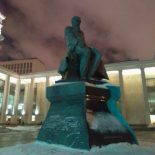Ballet at the Royal Opera House
As I was passing through Covent Garden yesterday, I decided on a whim to stop at the Royal Opera House, where I was lucky enough to acquire a ticket for the evening’s performance: a triple bill featuring George Balanchine’s Four Temperaments, Untouchable by Hofesh Shechter, and Kenneth MacMillan’s Song of the Earth. Having heard of none, It was also my good fortune to sit next to a kind hearted lady who told me stories about the performing dancers, ballet, Laurence Olivier, Bernard Haitink and much more besides. (She was no fan of a tyrannically depicted Bryn Terfel)
What little I know about Ballet had been garnered from the ROH’s excellent youtube site, which features a variety of instructional resources, clips and masterclasses making an introduction to this elegant art form easier than it has probably ever been.
The programme began with George Balanchine’s Four Temperaments, set to the angular, driving music of Paul Hindemith. There were admirable solos from Steven McRae, and the high degree of technical accomplishment from all was evident. The final variation was particularly memorable, conveying a sense of activity and rapture entirely befitting the music. Convention of this sort was absent from the dark, energised world of the central work, a piece both choreographed and composed by Hofesh Shechter. Being a world premiere, it was the most unfamiliar and therefore keenly anticipated work by the audience. Relying on continuous rhythms for tension, the music had an anguished quality. Its subject was ostensibly war, parts of the stage being obscured by smoke, as bodies writhed on the ground or stood rank and file, occasionally breaking out into rapid, coordinated movements. When the drums ceased, there was no moment of repose. The contrast between the pieces demonstrated the company’s versatility.
‘Dunkel ist das Leben, ist der Tod’ (dark is life, dark is death) is the sentiment which begins Mahler’s Das Lied Von Der Erde, charting a journey from the pains of obsessive self-doubt, to the softly repeated ‘ewig’ (eternity) of the finale Der Abschied. The vocal parts were sung especially well by Catherine Wyne Rogers and Samuel Sakker, both with the requisite strength and lyricism to carry the narrative and emotional range of the music. Carlos Acosta received a sterling round of applause at the curtain for his performance of the Messenger of Death, suggesting no simplistic, sinister presence but the natural movements of a force beyond our control. The pas de trois performed by Acosta, Thiago Soares and Marianela Nunez in the final song was one of the highlights of the evening, and epitomises Macmillan’s unique, earthy choreography. As they moved through the increasing brightness at the close, I was reminded of Bernstein’s comments about the ethereal music which was their accompaniment: ‘I always hear Keat’s ‘Nightingale’ ringing in my ears…’was it a vision, or a waking dream? Fled is that music. Do I wake or sleep?’
Even to a foolish novice, there is something curiously satisfying about watching live ballet, as though the dancers are thoughts in the mind of a cosmic theatre, interacting, combining, and detaching from one another, all with the same simplicity and lack of artifice that characterise our freest ideas.
